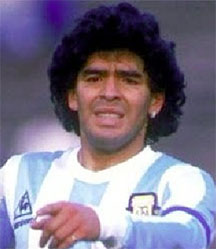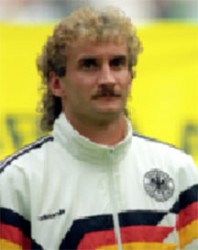RIO DE JANEIRO, (Reuters) – Argentina and Germany have appeared collectively in nine previous World Cup finals and two against each other. The South Americans beat West Germany to win the 1986 World Cup before the Europeans gained revenge in the final four years later.
Here is a look at their previous final appearances:
1930 MONTEVIDEO, July 30: URUGUAY 4 ARGENTINA 2

Pablo Dorado scored the first goal in a World Cup final when he put hosts Uruguay ahead after 12 minutes, but an upset looked possible as Carlos Peucelle and Guillermo Stabile replied to put Argentina ahead by halftime.
Most of the 93,000 crowd watching at the Centenario Stadium were willing Olympic champions Uruguay on and they duly got their wish as Pedro Cea, Victoriano Iriarte and Hector Castro scored three times in the second half as Uruguay were crowned the first world champions.
1954 BERNE, July 4: WEST GERMANY 3 HUNGARY 2
One of the greatest upsets in World Cup history ended the dominance of Hungary’s “Magnificent Magyars” team of the early 1950s. Hungary had seemed destined to win the 1954 World Cup with a team including Ferenc Puskas, Nandor Hidegkuti and Jozsef Bozsik going on a 32-match unbeaten run.
They had beaten West Germany 8-3 in the group stage and led 2-0 in the final after only eight minutes thanks to goals from Puskas and Czibor.
But on a rainy day that became known in Germany as the “Miracle of Berne”, Max Morlock made it 2-1 before Helmut Rahn struck in the 18th and 84th minutes to seal a first World title for Germany.
1966 LONDON, July 30: ENGLAND 4 WEST GERMANY 2 (aet)
Geoff Hurst remains the only player to score a hat-trick in the World Cup final after his treble helped England win the title on their only appearance in the final.
Hurst’s second goal, which was allowed to stand after the ball hit the bar and bounced back down onto the Wembley pitch, is the most controversial goal in World Cup history as it has never been proved that it conclusively crossed the line.
It put England 3-2 ahead before he completed his hat-trick with the last kick of the game. Helmut Haller and Wolfgang Weber scored for Germany, while Hurst’s West Ham United team mate Martin Peters scored England’s other goal and their club skipper Bobby Moore lifted the cup.
1974 MUNICH, July 7: WEST GERMANY 2 NETHERLANDS 1

The Dutch had captured the world’s imagination with their brilliant forward Johann Cruyff inspiring their Total Football approach, but it was not enough as the more pragmatic Germans triumphed on home turf.
The Netherlands took the lead before a German player had even touched the ball when Johan Neeskens struck a second minute penalty.
But the hosts levelled when Paul Breitner equalised with a second penalty after 25 minutes – the first two penalties awarded in a World Cup final.
Gerd Mueller scored what proved to be the winner two minutes before halftime, a then record 14th career World Cup goal, as West Germany became the first team to be European and world champions simultaneously.
1978 BUENOS AIRES June 25: ARGENTINA 3 NETHERLANDS 1 (aet)
The Dutch were beaten in the final by the host nation for the second successive World Cup when Argentina, back in the final after a 48-year absence, became world champions for the first time.
Mario Kempes put Argentina ahead after 38 minutes before Dick Nanninga became the first substitute to score in the final with an equaliser eight minutes from the end of normal time.
But there was no stopping Argentina in extra time. Kempes scored his second before Daniel Bertoni made it 3-1 with five minutes to play on a pitch strewn with streamers and ticket-tape.
1982 MADRID July 11: ITALY 3 WEST GERMANY 1
West Germany reached the final despite losing to Algeria in their opening match. A “manufactured” 1-0 win over Austria allowed both European teams to advance instead of Algeria, with the Germans edging France in a penalty shootout in the semi-finals. They met their match against the Italians in the final in the Spanish capital, though.
Paolo Rossi, with his sixth goal in three games, Marco Tardelli and Alessandro Altobelli put Italy 3-0 up before Paul Breitner added a late consolation.
1986 MEXICO CITY June 29: ARGENTINA 3 WEST GERMANY 2
The first meeting between this year’s two finalists was a classic, with Argentina inspired to victory by the irrepressible Diego Maradona.
Jose Luis Brown and Jorge Valdano scored for Argentina, who were coasting to victory until the Germans rallied in the final stages with a 74th minute goal from Karl-Heinz Rummenigge and an 80th minute equaliser from Rudi Voeller.
But just when the Germans thought they had done enough to force extra time, Maradona found the perfect pass for Jorge Burruchaga to run on and score the winner six minutes from time.
1990 ROME July 8: WEST GERMANY 1 ARGENTINA 0
After the magnificent final in Mexico City, West Germany and Argentina met again four years later and produced arguably the worst.
Argentina substitute Pedro Monzon became the first player to be sent off in the final when he tried to take out Juergen Klinsmann in the 65th minute. Gustavo Dezotti was also sent off in the 87th minute, two minutes after a woeful spectacle had been decided by an 85th minute Andreas Brehme penalty.
2002 YOKOHAMA June 30: BRAZIL 2 GERMANY 0
The Germans reached their seventh final – and lost for a record fourth time – when two goals from Ronaldo gave Brazil a 2-0 win in the first ever World Cup meeting between the two countries.
The final featured strongly in the build-up to this year’s last four clash between the two teams in Belo Horizonte on Tuesday which Germany won in astonishing fashion 7-1.
Miroslav Klose, Germany’s only survivor from the 2002 team, scored against Brazil on Tuesday, to take his tally to 16 World Cup goals, beating the record of Ronaldo set in the final in Japan.





